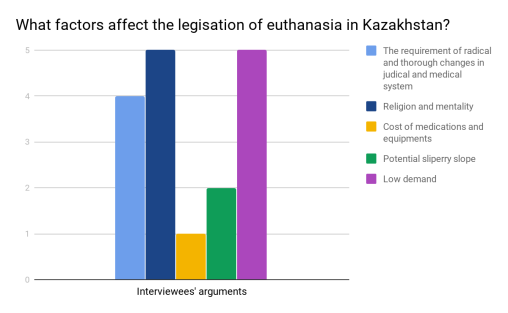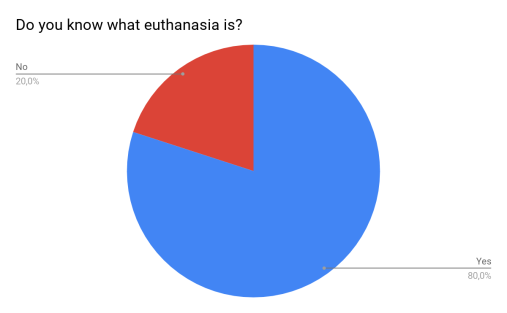Euthanasia is defined as «the painless killing of a patient suffering from an incurable and painful disease» (UNTERM). Dr. Nitschke was the first doctor in history who practiced euthanasia legally. «People say I am a killer. But I do not think all suicide is bad», he said in his interview (Moreton, 2009). Until today, there are remaining two opposite views regarding euthanasia.
The issue of legalizing euthanasia is significant on a global scale and for Kazakhstan as well. The United Nations Human Rights Committee organized a conference in November 2017 in Geneva which focused on facilitating access to euthanasia as all member states were signatories for the «International Covenant on Civil and Political Rights» (1966), and adopted the 1948 Universal Declaration of Human Rights. However, only a few countries legalized euthanasia: Switzerland, Netherlands, Belgium, Luxembourg, Canada, Colombia (Davis, 2019).
The purpose of my research is to study the ethics of mercy killing in Kazakhstan. To achieve this goal, the following research questions were posed: 1) Why is euthanasia not legalized in Kazakhstan? 2) What are the outlooks of Kazakhstani experts on euthanasia and its legislation?
According to Weyers (2006), the legalization of euthanasia is possible only after the society experiences changes relating to three main criteria. These shifts include acceptance and pervasiveness of individualization, diminishment of taboos about death, and realization that prolonging life is not necessarily a suitable treatment for all patients. It might be challenging for Kazakhstan to legalize euthanasia as the first change in our society has not taken place yet. Some studies have shown that collectivism in Kazakhstani society predominates individualism (Karabayeva, Mussabaev, Madaliev, Bakkitzhamal, 2018). In addition, taboos regarding death prevail in Kazakhstan since Islam is the largest religion in the country. As written in the main text of Islam (Koran), this kind of practice is not appropriate, and only Allah chooses how long each person will live. Concerning the third change, some people in Kazakhstan do not assume ending one’s life right, and doctors are concerned about the further consequences of performing euthanasia. The authorities conducted a social survey (2002), the purpose of which was studying the viewpoints of medical professionals about mercy killing. The results revealed that 42.5 % of doctors supported this kind of practice, and 19.9 % were not sure. However, 54.1 % of supporting doctors answered that they did not want to perform it. (Carp, Potapchuk, 2004). It shows that the majority of physicians do not want to take such responsibilities as their rights are not protected by law.
Considering the social facets of legalizing euthanasia, it is significant to study the perspectives of experts in various fields. Hence, the opinions of specialists in Kazakhstan were interpreted. The chairman of the board of the Regional Public Fund «Kazakhstan Alliance of Medical Organizations», dentist and lawyer Dauletkhan Yessimov does not think that doctors should take pity on terminally ill people. He believes that the duty of medical practitioners is to provide medical aid. Dauletkhan Yessimov also mentioned that if the government conducted a survey about euthanasia, residents of Kazakhstan would not have agreed to legalize this practice. (Svetlana Shesternyova, 2019) Doctor of Medical Sciences Eldos Izatullaev expressed another opinion. He thinks that euthanasia is an act of humanity from the lens of ethics. Nevertheless, he is worried about the possible risks of legalizing it as relatives of the patient or any natural person may put pressure on a doctor to end life of a patient. Moreover, in his opinion, there will be fewer requests for euthanasia soon due to the advances in medicine and healthcare technology. (Anastasia Tsirulik, 2010).
Secondary research was conducted using credible data from Google Scholar and EBSCO. The next step involved doing primary research and I used a qualitative approach, which includes taking interviews.
The participants were a head doctor of the local clinic, a nurse, a lawyer, an imam, and a psychologist. The purposeful sampling of interviewees for qualitative data collection was used. Moreover, I tried to opt for skillful people in various fields as I wanted to analyze how opinions differ among experts in accordance with their line of work.
During an interview, I found out various reasons why euthanasia is forbidden in Kazakhstan. What should be highlighted is that most of the respondents connected this issue to their field of work which shows that the topic of euthanasia touches on various aspects of life. The findings concerning the main reasons why euthanasia is illicit in Kazakhstan are summarized in Figure 1.

Fig. 1. Main factors that affect the legislation
It is apparent from this table that three main explanations of why mercy-killing is banned in our country are religion and mentality, absence of appeal for changing the law from society, as well as potential risks the legalization might bring to judicial and medical systems. However, the high cost of drugs and the expected «slippery slope,» which may lead to permissiveness and moral degradation, do not have a comparable influence on the law concerning euthanasia.
With reference to euthanasia being unlawful in Kazakhstan, the discussion with five experts from various fields revealed that the majority of interviewees were familiar with the term euthanasia and had a general knowledge of what it is (Figures 2 and Table 1).

Fig. 2. The general knowledge of experts about euthanasia
Table 1
Attitudes towards euthanasia
|
Do you support this practice? |
Answers of participants (%) |
|
Yes, I support |
0 |
|
No, I do not |
80 |
|
I am not sure |
20 |
Most of the respondents were against this practice noting that euthanasia questions the principles of ethics and the dignity of professionals. The participants were also sure that they would not be able to carry out euthanasia. It was also mentioned that instead of legalizing euthanasia Kazakhstan should find solutions to helping such patients stay strong in a period of hardship by focusing on palliative care.
With regard to euthanasia being illegal in Kazakhstan, primary research manifested that the majority of experts do not support euthanasia and would not be able to conduct it due to subsequent moral pressure. However, Kazakhstan may support terminally ill people by investing in palliative care or launching organizations that would provide emotional and financial aid to patients. Apart from this, it might be helpful to initiate a program that makes the last wishes of patients come true.
The research influenced my perspective concerning the legislation of euthanasia in Kazakhstan. I realized that permitting this procedure will pose a threat to our country as the society itself is not ready for this kind of change. However, I still believe that this issue should be analyzed thoroughly at a national level because the awareness of the public about euthanasia is low.
References:
- Euthanasia doctor: ‘I don’t call it killing’ — BBC Stories. (2019, May 5). [Video file]. Retrieved from https://www.youtube.com/watch?v=RdK0neywYOc
- Carp, L. L., & Potapchuk, T. B. (2004). The problem of euthanasia: «For» and «Against». Retrieved from http://ecsocman.hse.ru/data/422/927/1219/019.KARP.pdf
- Davis, N. (2019). Euthanasia and assisted dying rates are soaring. But where are they legal? The Guardian . Retrieved from
- https://www.theguardian.com/news/2019/jul/15/euthanasia-and-assisted-dying-rates-are-soaring-but-where-are-they-legal
- Moreton, C. (2009). This article is more than 10 years old «People say I’m a killer. I just have to live with it.» The Guardian . Retrieved from https://www.theguardian.com/society/2009/may/08/assisted-suicide-euthanasia-philip-nitschke
- Shesternyova, S. (2019, October 31). Право на смерть: почему в Казахстане эвтаназия под запретом. Retrieved from https://365info.kz/2019/10/pravo-na-smert-pochemu-v-kazahstane-evtanaziya-pod-zapretom
- Tsirulik, A. (2010, May 17). В медицинской общественности Казахстана проблема эвтаназии не считалась актуальной. Retrieved from https://www.zakon.kz/172445-v-medicinskojj-obshhestvennosti.html
- Weyers, H. 2006. Explaining the emergence of euthanasia law in the Netherlands: How the sociology of law can help the sociology of bioethics. Sociology of Health and Illness 28(6): 802–816. Retrieved from https://onlinelibrary.wiley.com/doi/pdf/10.1111/j.1467–9566.2006.00543.x
- Zhuldyz Kabayeva, Bakittizhamal, Sapargali Mussabaev, & Zhanyl Madalieva. (2018). The formation way of independent Kazakhstan from the individualism and collectivism perspective. Opcion , 34 (85–2), 706–728. Retrieved from https://www.redalyc.org/jatsRepo/310/31057290029/html/index.html











